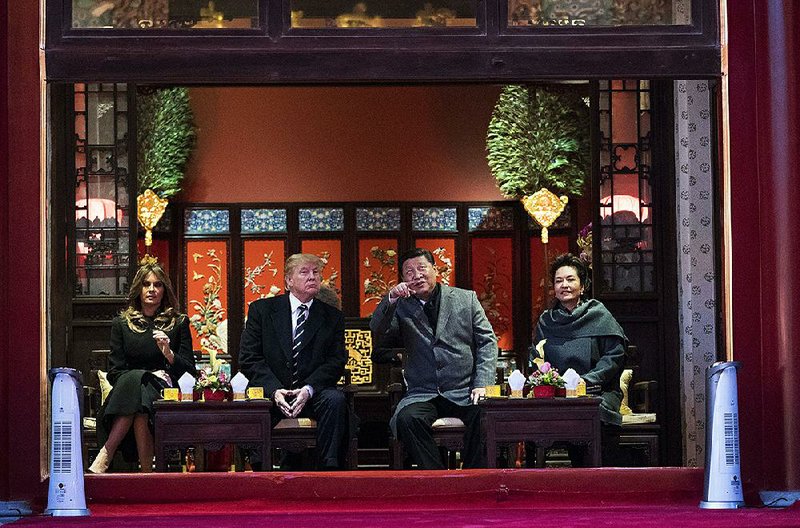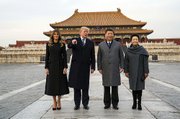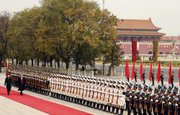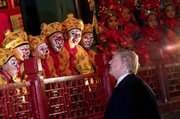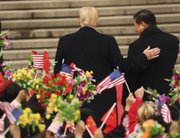BEIJING -- President Donald Trump emerged from a lengthy meeting with Chinese President Xi Jinping today to declare that he believed he and Xi together can solve "probably all" the world's problems.
"I look forward to many years of success and friendship working together to solve not only our problems, but world problems, and problems of great danger and security," Trump said between meetings at the Great Hall of the People. "I believe we can solve almost all of them, and probably all of them."
Trump and Xi were discussing a series of thorny issues during Trump's second day in China, including China's willingness to put the squeeze on North Korea over its nuclear weapons program, and the U.S.-China trade relationship.
Trump projected confidence on both fronts. He said both he and Xi believe "a solution" exists on North Korea. And he said the countries' trade relationship -- which he complained had gotten "so far out of kilter" -- would be made "fair, and it'll be tremendous for both of us."
[PRESIDENT TRUMP: Timeline, appointments, executive orders + guide to actions in first 200 days]
Xi, meanwhile, said U.S.-China relations were at a "new historic starting point." He said China was willing to work with the U.S. "with mutual respect, seeking mutual benefits, to focus on cooperation and control our differences."
Before the meetings, China rolled out the red carpet for Trump, treating him to an elaborate welcome ceremony on the plaza outside the Great Hall of the People before the leaders turned to their private talks.
Trump looked on approvingly as a Chinese honor guard played the national anthems of both countries, cannons boomed and soldiers marched. He clapped and smiled as children waving U.S. and Chinese flags and flowers screamed and jumped wildly.
Before arriving, Trump delivered a stern message to Beijing, using an address to the National Assembly in South Korea to call on nations to confront the North.
"All responsible nations must join forces to isolate the brutal regime of North Korea," Trump said. "You cannot support, you cannot supply, you cannot accept."
He called on "every nation, including China and Russia," to fully implement U.N. Security Council resolutions enforcing sanctions against North Korea aimed at depriving its government of revenue for its nuclear and ballistic missile programs. The latest measure, adopted after a September nuclear test that was the North's largest yet, banned imports of its textiles and prohibited new work permits for overseas North Korean laborers. It also restricted exports of some petroleum products.
Trump's words drew a caustic response from North Korean state media, which issued a statement Wednesday saying the U.S. should "oust the lunatic old man from power" and withdraw its "hostile policy" toward Pyongyang "in order to get rid of the abyss of doom."
White House officials said Trump would underscore his public messages about North Korea when he and Xi sit down for private talks today. China is North Korea's largest trading partner, and Trump is expected to demand that the nation curtail its dealings with Pyongyang and expel North Korean workers from its borders. Trump has praised China for taking some steps against Pyongyang, but he wants it to do more.
China is increasingly disenchanted with North Korea over its nuclear weapons development but remains wary of using its full economic leverage over its traditional ally. It fears triggering a collapse of the North's totalitarian regime that could cause an influx of refugees into northeastern China and culminate in a U.S.-allied unified Korea on its border.
China poured on the pomp and pageantry for Trump's arrival Wednesday. The president and first lady Melania Trump were greeted at the airport by dozens of jumping children who waved U.S. and Chinese flags. The couple spent the first hours of their visit on a private tour of the Forbidden City, Beijing's ancient imperial palace. It's usually teeming with tourists but was closed to the public for the presidential visit.
The Trumps walked alongside Xi and his wife through the historic site and admired artifacts from centuries past. Trump posed for photos and joked to Xi about the reporters watching. And he laughed and clapped along during an outdoor opera featuring colorful costumes, martial arts and atonal music.
Trump said he was "having a great time" in China. But much of the remainder of his stay in Beijing will revolve around negotiations over trade with Pyongyang and other matters. The president also is expected to showcase a round of business deals signed Wednesday by Chinese and U.S. companies that the two sides valued at $9 billion.
Among them: a pledge by China's biggest online retailer to buy $1.2 billion of American beef and pork. Such contract signings are a fixture of visits by foreign leaders to China.
Later in the day, U.S. officials said the White House plans to announce upward of $250 billion in business deals in China this week.
Commerce Secretary Wilbur Ross boasted of that number in a meeting with chief executives in China but offered few details, two people who attended the meeting said. A U.S. official confirmed the amount.
The details of the pending deals couldn't be immediately learned Wednesday. Many of the deals are expected to be in the form of nonbinding memorandums of understanding, not contracts.
Trump has made narrowing the multibillion-dollar U.S. trade deficit with China a priority for his administration -- and Ross said Wednesday that the deals were a step in the right direction.
"Achieving fair and reciprocal treatment for the companies is a shared objective," Ross said. "Today's signings are a good example of how we can productively build up our bilateral trade."
China's trade surplus with the United States in October widened by 12.2 percent from a year earlier, to $26.6 billion, according to Chinese customs data released Wednesday. The total surplus with the United States for the first 10 months of the year rose to $223 billion.
DOUBTING TRUMP'S STRATEGY
Trump is not the first U.S. president to turn to China to try to rein in North Korea. But the administration has tried anyway as the North closes in on a nuclear missile that can hit the United States.
Trump arrived Wednesday in China for the stiffest test yet of his bet that by cultivating Xi and offering him concessions, like delaying punitive trade moves, he can persuade him to move against North Korea in a way that none of his predecessors have.
Yet it may be a gamble, analysts say, based on a fundamental misreading of Beijing's influence over North Korea and especially its young leader, Kim Jong Un, under whom relations between the erstwhile allies have steadily deteriorated.
China, some analysts argue, just does not have the leverage over North Korea that Trump thinks it has.
"There are big differences in the way of thinking between the United States and China on North Korea," said Yang Xiyu, a former Chinese Foreign Ministry negotiator regarding North Korea. "Trump thinks of North Korea too simplistically -- that if China cuts off the oil, the nuclear issue will be solved."
Trump has invested heavily in the relationship with Xi, often speaking of him in unusually flattering terms for a U.S. president describing a Chinese communist strongman. And despite his strident criticism of China's trade practices, he has offered Xi an unspoken quid pro quo that Washington would hold off on major trade action against Beijing.
"Trump somewhat naively calculated that China would be more helpful on North Korea if he was magnanimous on trade; I doubt Beijing sees it that way," said Matthew Goodman, a political economist at the Center for Strategic and International Studies and an adviser on Asian economics in the administrations of Barack Obama and George W. Bush.
China supplies much of North Korea's energy; almost all of its crude oil flows in an 18-mile pipeline from the port city of Dandong, under the Yalu River, into the North Korean town of Sinuiju.
But some China experts said Trump failed to understand the limits of Chinese influence on the North. Although China fought alongside the North against the United States in the 1950-53 Korean War and remains its chief economic patron, the two countries are barely friends.
Some Chinese call the relationship a "fake alliance." The two militaries have no working relationship. Early in his rule, Kim executed his uncle, Jang Song Thaek, who had served as the primary conduit between the North and China's senior leadership.
Officials in Beijing and Washington point out that China has taken some measurable steps on North Korea. After the North's accelerating nuclear tests and intercontinental ballistic missile launches, China approved tougher sanctions at the United Nations.
Information for this article was contributed by Jonathan Lemire, Jill Colvin and Matthew Pennington of The Associated Press; by Mark Landler and Jane Perlez of The New York Times; and by Li Hui, Jeff Sutherland, Nick Wadhams, Jack Kaskey and other staff members of Bloomberg News.
A Section on 11/09/2017
